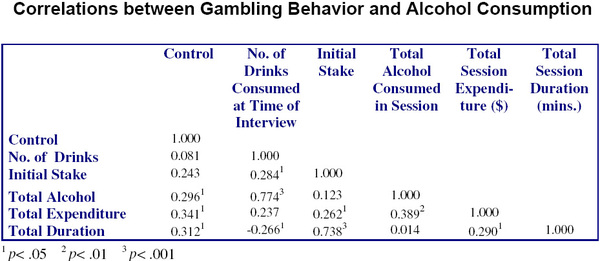The WAGER, Vol 4(39) – Drinking and Gambling: Whither the Relationship? (Part II)
Last week’s WAGER (Vol. 4, Issue 38) reviewed a recent study that examined the effect of alcohol consumption on betting behavior in a particular gambling task. This week the WAGER considers a different perspective on the matter. Baron and Dickerson (1999, in press) utilized a two-phase design to study 45 users of video gaming devices near Sydney in Australia. Upon consenting to participate, patrons were interviewed about the gaming and drinking in which they had taken part during their current session of gambling. They were then given a questionnaire to take home, fill out, and return. Both the interview and the mail-in survey included items to measure the subject’s perception of his or her ability to control gambling behavior. Although 116 interviews were conducted and 105 subjects agreed to take home the survey instrument, only 45 interviewees returned their questionnaires and thus were considered given the design of the study. In an attempt to investigate a possible relationship between a subject’s alcohol consumption and his or her gambling behavior, several factors were considered: duration of gambling, amount spent on gambling, initial amount staked, number of drinks consumed, and total alcohol consumed during the session. A matrix of correlations between these factors is presented below. Control of gambling behavior was measured using a scale on which higher values indicate decreased levels of control.

Significant correllations with impaired control were found for the the factors of total amount spent gambling in a session and the total duration of the gambling session. But for the current discussion, the most important finding is the statistically significant correllation (r =0.296, p<.05) between total alcohol consumed in a gambling session and impaired control of gambling behavior. However, a regession analysis revealed that alcohol consumption was not a significant predictor of impaired self-control. When these statistical analyses are integrated and considered, there is only partial evidence for a moderate relationship between drinking alcohol during a particular gambling session and impaired control over gambling within that same session.
While last week’s WAGER focused on a study that investigates the effect of alcohol on a particular cognitive process (i.e., betting decisions), the present study examines the effect of alcohol on the ability to control gambling behavior. Thus, it is difficult to aggregate the two studies to produce a simple, single conclusion. This is very often the case in research – similarities in topic or content among studies do not necessarily translate into similarities in research aims, methodology, or analyses.
Source: Baron, E. & Dickerson, M. (in press). Alcohol consumption and self-control of gambling behavior. Journal of Gambling Studies, 15(1).
The WAGER is funded, in part, by the National Center for Responsible Gaming, the Massachusetts Department of Public Health, the Andrews Foundation, the Addiction Technology Transfer Center of New England, the Substance Abuse and Mental Health Administration Services, and the Center for Substance Abuse Treatment.